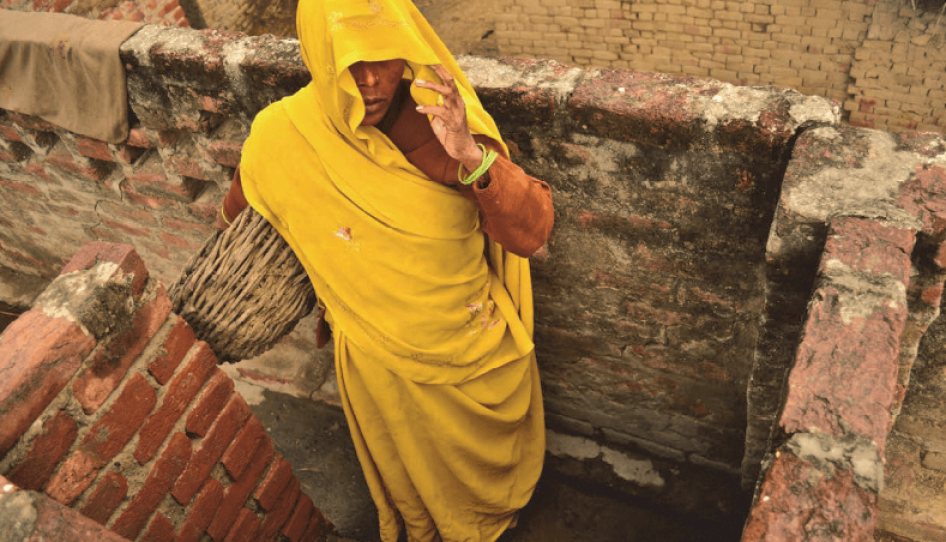(Washington, DC) – A high-level international meeting on sanitation should address barriers to realizing the human right to sanitation with privacy and dignity, Human Rights Watch said in a report released today. The United Nations and Sanitation and Water for All, a global public-private-civil society partnership to make water and sanitation accessible to everyone, will convene a meeting of finance and water and sanitation ministers on April 19 and 20, 2017 in Washington, DC, on global sanitation and drinking water challenges.
The 46-page report, “‘Going to the Toilet When You Want’: Sanitation as a Human Right,” is based on more than a decade of reporting by Human Rights Watch on the abuses, discrimination, and other obstacles people encounter in trying to perform the simple act of relieving themselves with dignity and in safety. As of 2015, 2.4 billion people around the world were estimated to be using unimproved sanitation facilities, defined as those that do not hygienically separate human excreta from human contact. Nearly a billion people practice open defecation – which has been linked to malnutrition, stunting, and increased diarrheal disease, among other harmful effects.
“The way people are able to manage their bodily functions is at the core of human dignity,” said Amanda Klasing, senior women’s rights researcher at Human Rights Watch. “Beyond the personal affront, lack of sanitation significantly undermines other human rights, including health and gender equality.”
The right to sanitation, which is derived from the right to an adequate standard of living, entitles everyone to sanitation services that provide privacy and ensure dignity, and that are physically accessible, affordable, safe, hygienic, secure, and socially and culturally acceptable. However, women, men, and children often do not have facilities that reflect the content of this right in various settings, including in schools, migration and displacement camps, prisons, work sites, and their homes.
Human Rights Watch has conducted research from 2005 to 2017 in countries including China, India, Nepal, Russia, South Africa, and the US. The research highlights some of the barriers to realizing the right to sanitation in these settings and some of the effects of a lack of sanitation on a range of other human rights. In almost every context, discrimination – based on caste, gender, disability, age, or other protected status – prevents some people from obtaining adequate sanitation and perpetuates other forms of inequality for marginalized populations.
“We had a toilet, but it was not good. If there are proper toilets, girls will feel better when they are on their periods and have to change their pads. Many girls stay home during their periods,” Chandni Rai, 19, said of the difficulties of managing menstrual hygiene at school, and the effect this had on girls’ education in Nepal.
Women and girls often face discrimination in having safe and private sanitation facilities and the material resources to manage their menstruation, Human Rights Watch found. This lack of access may undermine other rights, including to education, health, work, and gender equality.
A lack of access to safe, accessible, and private sanitation facilities can also undermine the rights of people with disabilities, older adults, and transgender and gender non-conforming individuals, Human Rights Watch said. Toilets, open defecation fields, and bathing facilities can become the site of sexual violence and harassment. Government failure to consult with communities and facilitate participation in decision making, particularly with marginalized minorities, may also compound discrimination and exclusion in access to sanitation.
Human Rights Watch also documented government failure to fully respect, protect, and fulfill the right to sanitation for people deprived of their liberty in jails or detention centers, often at the expense of other human rights.
The United Nations 2030 Agenda for Sustainable Development calls, in its Goal 6, for access to adequate and equitable sanitation and hygiene for all by 2030 and for an end to open defecation. To achieve that goal, governments and donors need to address sanitation as a human right and make funding commitments to eliminate barriers to sanitation and to address discrimination. They should also make sure that participation by the groups involved and accountability for a lack of adequate facilities are built into their investments in sanitation.
“We have talked with people with disabilities who described crawling up steps to an inaccessible toilet, women in displacement camps who were terrified to venture to a toilet in a remote area, and people who had no access to sanitation facilities at all,” Klasing said. “Efforts to ensure adequate and safe sanitation and hygiene resources should be rooted in the human right to sanitation for everybody.”









